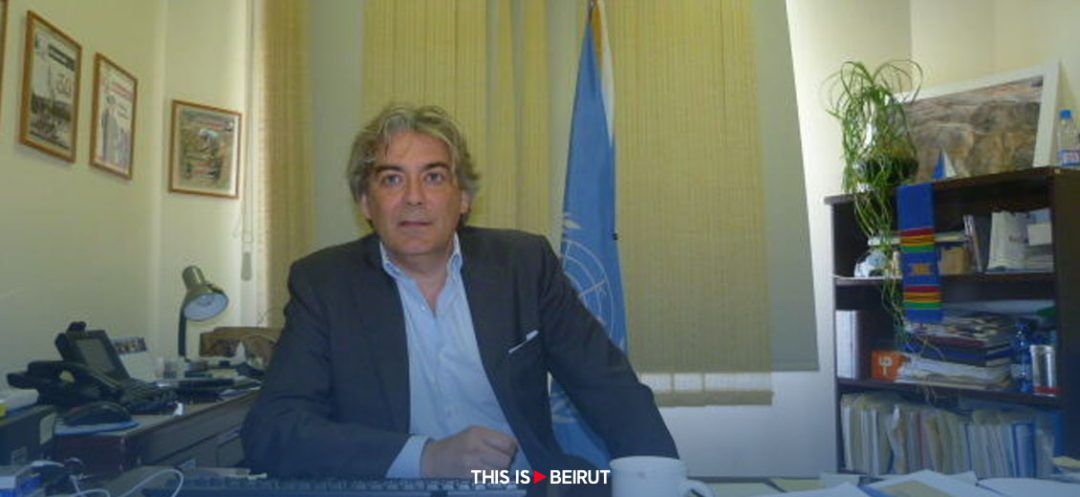- Home
- War in the Middle East
- Tenenti: Situation in Southern Lebanon Has Become "Very Worrying and Dangerous"

UNIFIL's spokesman in Lebanon, Andrea Tenenti, said on Wednesday that "the situation in southern Lebanon has become very worrying and dangerous," adding that the circle of fighting has widened since Hezbollah opened a front in southern Lebanon on October 8 in support of Hamas in its war against Israel in Gaza.
"The exchanges of fire that began several months ago within a radius of five to six kilometers near the Blue Line have spread to areas inside Lebanon, with some targets reaching Baalbek and Hermel in the northeast of the country, 130 kilometers from the Blue Line," he said in an interview with the Independent Arabiya media.
Regarding the development of the bombardments and the possibility of them taking a more dangerous turn, Tenenti insisted that "no one can predict the dangers of these targets or the future of this front, as any miscalculation could trigger a wider conflict."
“We have been working with the parties concerned to try to calm the situation for several months and, above all, to prevent the front from sliding into a dangerous war," he asserted, stressing that UNIFIL is the only body capable of communicating with both sides of these two long-warring countries, namely Lebanon and Israel.
"Current events have reinforced the conviction and understanding of both parties as to the importance of implementing UN Security Council Resolution 1701 as a means of regaining stability," explained Tenenti, stressing that "the full implementation of UNSC Resolution 1701 can be the solution to this conflict and lead to new opportunities for all parties."
In his view, this should be done "in partnership with the Lebanese Army, but also through the intermediary of the international community, to strengthen the Army's role. In this respect, he stressed the need to support the Army to have the necessary capabilities and means to control southern Lebanon, particularly in terms of manpower. Indeed, Resolution 1701 calls for the deployment of some 15,000 Lebanese Army troops in the south.
He also pointed out that "the work of monitoring the situation remains in place despite the challenges," as does collaboration with the Lebanese Army, which is "our strategic partner."
In this context, Tenenti revealed that "UNIFIL has held more than 150 direct meetings between the Lebanese and Israeli armies since 2006, which has made it possible to avoid numerous conflicts and to work towards clarifying the Blue Line," deeming this "a great success." However, these meetings have come to a halt since last October, when the war in Gaza began.
Tenenti also noted that there needs to be communication between UNIFIL and Hezbollah. The latter "only communicates with the Lebanese authorities and the local authorities," he pointed out.
"The exchanges of fire that began several months ago within a radius of five to six kilometers near the Blue Line have spread to areas inside Lebanon, with some targets reaching Baalbek and Hermel in the northeast of the country, 130 kilometers from the Blue Line," he said in an interview with the Independent Arabiya media.
Regarding the development of the bombardments and the possibility of them taking a more dangerous turn, Tenenti insisted that "no one can predict the dangers of these targets or the future of this front, as any miscalculation could trigger a wider conflict."
“We have been working with the parties concerned to try to calm the situation for several months and, above all, to prevent the front from sliding into a dangerous war," he asserted, stressing that UNIFIL is the only body capable of communicating with both sides of these two long-warring countries, namely Lebanon and Israel.
"Current events have reinforced the conviction and understanding of both parties as to the importance of implementing UN Security Council Resolution 1701 as a means of regaining stability," explained Tenenti, stressing that "the full implementation of UNSC Resolution 1701 can be the solution to this conflict and lead to new opportunities for all parties."
In his view, this should be done "in partnership with the Lebanese Army, but also through the intermediary of the international community, to strengthen the Army's role. In this respect, he stressed the need to support the Army to have the necessary capabilities and means to control southern Lebanon, particularly in terms of manpower. Indeed, Resolution 1701 calls for the deployment of some 15,000 Lebanese Army troops in the south.
He also pointed out that "the work of monitoring the situation remains in place despite the challenges," as does collaboration with the Lebanese Army, which is "our strategic partner."
In this context, Tenenti revealed that "UNIFIL has held more than 150 direct meetings between the Lebanese and Israeli armies since 2006, which has made it possible to avoid numerous conflicts and to work towards clarifying the Blue Line," deeming this "a great success." However, these meetings have come to a halt since last October, when the war in Gaza began.
Tenenti also noted that there needs to be communication between UNIFIL and Hezbollah. The latter "only communicates with the Lebanese authorities and the local authorities," he pointed out.
Read more



Comments